Saudi Arabia
 From Rationalwiki
From Rationalwiki “”Outraged? I'm barely surprised. This is a country where women aren't allowed to drive a car. They're not allowed to be in the company of any man other than a close relative, they're required to adhere to a dress code that would make the Maryknoll nun look like Malibu Barbie. They beheaded 121 people last year for robbery, rape, and drug trafficking; they've no free press, no elected government, no political parties, and the royal family allows the religious police to travel in groups of six, carrying nightsticks and they freely and publicly beat women. But 'Brutus is an honorable man.' 17 schoolgirls were forced to burn alive because they weren't wearing the proper clothing. Am I outraged? No...that is Saudi Arabia, our partners in peace.
|
| —CJ Cregg, The West Wing[1] |
The Kingdom of Saudi Arabia is a nation that occupies most of the Arabian Peninsula. It is an Islamic absolute monarchy[note 1] ruled by the House of Saud![]() , controlling a large oil corporation
, controlling a large oil corporation![]() , and propped up
, and propped up![]() by the United States government in exchange for continuing to sell gargantuan quantities of oil, and to continue selling it for US dollars.[note 2] Saudi Arabia, dominated by the fundamentalist Wahhabi branch of Islam, is one of the most repressive countries in the world, putting it in the running alongside such stellar governments as Eritrea, Zimbabwe, Syria, and North Korea. Its running tally of people executed for such "crimes" as apostasy, homosexuality, or adultery is horrifyingly high.
by the United States government in exchange for continuing to sell gargantuan quantities of oil, and to continue selling it for US dollars.[note 2] Saudi Arabia, dominated by the fundamentalist Wahhabi branch of Islam, is one of the most repressive countries in the world, putting it in the running alongside such stellar governments as Eritrea, Zimbabwe, Syria, and North Korea. Its running tally of people executed for such "crimes" as apostasy, homosexuality, or adultery is horrifyingly high.
The Arabian Peninsula was adjacent to some of the world's oldest civilizations, like Ancient Egypt and Ancient Iraq. During these ancient times, Arabia became a commercial hub for trade, and it consequently had some cosmopolitan and multi-religious settlements like early Mecca and Medina. Things changed when Muhammad got busy, as he claimed to have had a revelation from God and went on to found the world's second largest religion. He united the various tribes of Arabia before dying in 632 CE, and his successors created a series of caliphates which went on to spread the new religion far and wide through both conquest and peaceful propagation. Arabia was a significant region in the Islamic world ever since the religion's founding, as the Prophet's tomb is in Medina, and the religion's holiest city is Mecca. The religiously mandatory Hajj![]() draws millions of Muslims each year to Mecca.[2]
draws millions of Muslims each year to Mecca.[2]
The modern Kingdom of Saudi Arabia was founded by warlord and monarch Ibn Saud when he united the country through conquest in 1932. This was a very unfortunate event in history. During World War I, much of Arabia was under control of the Turkish Ottoman Empire, and the Arab Revolt against them received aid and support from the United Kingdom. Arab leadership was contested between the more moderate Hashemite dynasty (who now rule Jordan and are directly descended from Muhammad himself), and the radical Wahhabi House of Saud.[3] The British backed the Sauds after falling out with the Hashemites after the war, and this led to the Saudi victory.[4] Arabia has been crushed under a totalitarian monarchy ever since.[note 3]
Once in charge of one of the world's most valuable petrostates, the Saudis promptly used the revenues from selling black gold to finance the propagation of radical Wahhabi ideology across the Middle East, leading to the creation of generations of terrorists and militant organizations.[5] It's safe to say that Saudi Arabia is one of the most significant factors that ruined the once prosperous Middle East and turned it into the desperate warzone it is today. Despite this religious fundamentalism, the Saudi monarchs are also cold-blooded pragmatists. During the Cold War, they aligned with the Western Bloc against the Soviets, and they allowed the US to use Arabian soil as a springboard during the Gulf War. The House of Saud has been closely tied to the United States ever since, and this has caused some of the even more radical Islamists within their own country to turn against them. One of those people was Osama bin Laden, and no less than 15 Saudi citizens were among the hijackers on 9/11.[6] Even with all of that being well-known, Saudi Arabia still receives staunch support from the US and especially its current president and wannabe sultan, Donald Trump.[7][8]
Much of Saudi Arabia's influence stems from that age-old consideration, money oil. The House of Saud has many members, and the family has funneled much of their country's oil cash into creating their estimated $1.4 trillion wealth and funding their opulent playboy lifestyles.[9] Because surely that's what Islam is all about, right? Much of the rest of that money goes into spreading violence and disorder across the Middle East, from waging the devastating Yemeni Civil War to funding and radicalizing terrorist organizations. It's clear that the House of Saud has used its oil money to become one of the most malignant forces in the modern world.
Historical overview[edit]
Pre-Islamic era[edit]
The Arabian Peninsula existed in ancient times as a major cultural and religious crossroads — sandwiched between many major and distinct civilizations. The Red Sea and the Persian Gulf allowed for easy trade between Arabia and places like Egypt, Mesopotamia, Persia and India. As a result, the religious landscape of early Arabia was quite diverse, with most Arabs being pagans but many having adopted religious ideas from Christianity, Judaism, and even Zoroastrianism.[10] That would prove important, as the acceptance by many Arabs of monotheism would later prove an asset to the rising Islamic religion.
Arabia's geographical location made it a hub for trade, as its coastal ports provided nice layovers for traders selling goods up and down the Persian Gulf and Red Sea. This prosperity was mostly limited to the coastal areas early on, though — note the classical name for Yemen: Arabia felix (fortunate Arabia) — as the inhospitable Arabian desert made accessing the interior quite difficult for all but the hardiest of tribespeople. This changed in the first millennium BCE when the Arabs developed/adapted a method of saddling camels, and all-of-a-sudden they could then move goods across the desert fairly reliably.[11] Camels might be jerks, but they managed to essentially build Arabian civilization.
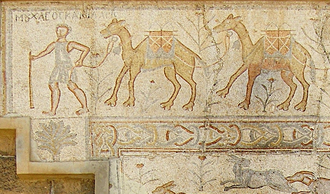
Caravan trade through Arabia exposed increasing numbers of people to foreign ideas, and it also allowed for significant trade-hub cities to begin springing up further inland. By far the most significant of these cities were Mecca and Medina. Mecca became the business and financial hub of the peninsula, basically the New York City of the ancient desert, while Medina operated as a major agricultural settlement.[12] Although Arabia was a tribal region, many of these tribes settled down in these cities to become merchants. The more elite tribes had more political and economic power, because things never really change.
Muhammad and the rise of Islam[edit]
Islamic history begins with their main prophet and the inventor of their religion, Muhammad. Muhammad was probably born sometime around 570 CE in Mecca, and he was a member of the prestigious and powerful Banu Hashim clan.[13] During his childhood and his growing-up years, he accompanied his uncle on caravan trade missions, probably being introduced to foreign religious ideas and customs along the way.[14] He allegedly had a pretty good reputation among his acquaintances and customers, being known as cheerful and honest.[15] He met his first wife, Khadija bint Khuwaylid,![]() who was herself a caravan manager and whom he stayed married to monogamously for about 25 years. D'aww.
who was herself a caravan manager and whom he stayed married to monogamously for about 25 years. D'aww.
Things went sideways for him when he apparently started receiving visions from the Archangel Gabriel, revealing parts of the Quran and urging him to completely tip over the apple cart of Arab life.[16] Mecca at this time was a major religious site of Arab pagan pilgrimage, so Muhammad's insistence that there was only one God and that idols should be destroyed was a bit unpopular with city authorities.[17] Muhammad's movement gradually attracted followers from the bottom rungs of Arab society, especially slaves, and many of them would be martyred in these early years as they were murdered or tortured for refusing to give up their new religion.[18][19]

After the death of his first wife and his family patriarch,[20] Muhammad was cast out of the Banu Hashim clan by one of his much less friendly relatives.[21] Absent his family's protection, the religious authorities of Mecca were free to do whatever they wanted to get rid of Muhammad. Realizing that his life was in danger, Muhammad fled to Medina, which at the time was a political rival of Mecca's. Religious disputes had gotten out of hand there, so the Medina authorities requested that this famous "prophet" guy come in and help them hash it out. Muhammad thus drafted what was effectively a constitution, turning Medina into what amounted to an early theocracy, but also providing for some basic rights for religious minorities.[22][23]
Muhammad rapidly converted most of the population of Medina before turning them into his holy army and setting out to take back Mecca. After a decades-long war during which Muhammad devised many of the more warlike passages of the Quran, the Islamic army captured Mecca and smashed the pagan idols in the city.[24] With his military power solidified, Muhammad went on to militarily unite most of the Arabian Peninsula. He died in Mecca, leaving to his successors a mighty Arab empire.
Caliphate rule and conquests[edit]
Muhammad had no real successor, since he had no sons, and God's message had been revealed only to him. Thus, Muhammad's followers created the title of "caliph", or vice-regent, and passed it off to Muhammad's old friend Abu Bakr.[17] An early convert, Abu Bakr proved to be quite the hardcore Muslim, and he purged the remaining Arab pagans and then swept forth to conquer more territory in the name of Islam. The Rashidun Caliphate, as it was called, conquered Egypt, the Levant, Iraq, and Iran before falling into internal disputes.[25] Two of the Rashidun caliphs were assassinated, and their political enemies, the Umayyad family, took control of the empire.[17] This action split the Islamic world into another succession dispute, and the Umayyads also saw fit to move the caliphate capital out of Arabia and into Syria. The Umayyad Caliphate would later be overthrown in 750 CE by the Abbasids, who formed their own caliphate. Amid all of this infighting and backstabbing, Arabia became increasingly inconsequential in political affairs despite its religious significance. The Islamic Golden Age, generally held to have begun under the Abbasid Caliphate, saw science, medicine, and philosophy gain popularity and support, and a prosperous renaissance period swept across the Middle East.[26]
Early sectarian conflicts[edit]
Arabia, though, was largely bypassed by these developments. The center of Islamic power had moved to Iraq, and with later conquests, that center of power would move further and further away. While Medina became a center for Islamic legal studies, the rest of Arabia became an irrelevant political backwater while Islamic learning and administration left it behind.[27] Instead, Arabia became the site of sectarian strife, as the caliphs disputed their successions and rival religious movements attempted to influence the Islamic world.
As the Middle Ages went on in Arabia, it became clear that there was a stark difference between the more pragmatic Islamic scholars and rulers and the utter fanatics who had formed the backbone of the caliphate armies and now inhabited the desert interior of Arabia. The fanatics later branched off and attempted to form their own offshoots of Islam. A Shia offshoot, the Kharijites, gained significant following around the Persian Gulf and took as its basis a complete opposition to the power of the caliphs.[27] The Kharijites took Muhammad's teaching about charity and asceticism to heart, and they were furious that the caliphs claimed high authority and lived in wealth. Another radical sect, the Qarmatians, seized control of Bahrain and attempted to establish a proto-communist society where all property was communally owned.[28] They rejected sharia law and considered the words of prophets like Jesus, Moses, and even Muhammad himself to be invalid.[29] In 930 CE, they even went so far as to attack the city of Mecca and desecrate it with corpses.[28] For decades, Qarmatian raids made Arabia into a dangerous and avoided region.[note 4]
Infighting among Muslims gradually caused the stagnation and eventual splitting of the Islamic world. As the power of the caliphs waned, Mecca and Medina themselves came under threat from various warlords, as shown by the Qarmatian example. Additionally, the rise of increasingly deranged interpretations of Islam was part of the same general trend that would later produce Wahhabism and the radical nature of the Saudi dynasty. Like these religious offshoots, the Sauds originated from Arabia's desert interior.
Rise of Wahhabism[edit]
From the beginning, there were two faces of Arabia. The western coastline and areas a bit further inland were called the Hejaz region, and its less arid and barren landscape gave rise to a more cosmopolitan societal structure.[27] It was also home to Arabia's great cities of Mecca and Medina. Hejaz had been controlled for most of its Islamic history by the Sharif of Mecca, who was a member of the Hashemite dynasty.[30]
Then you had Najd, which encompassed most of the harsh desert interior of Arabia. As we showed above, Najd's inhospitable landscape gave rise to inhospitable and religiously radical people. Most trade routes through Arabia avoided Najd, so its culture was far more rural and tribal.[27]
The Ottoman Empire eventually forced the Sharif of Mecca into becoming their vassal, largely due to their desire to block off Portugal's attempts to control trade routes in the Middle East.[31] The extent of Ottoman control over the Arabs was highly variable, and they generally preferred to rule with a loose hand early on.
Meanwhile, the Al Saud family had taken land close to the current city of Riyadh, and they slowly built up their power base. The fate of the dynasty would be closely tied to the rise of Muhammad ibn Abd al Wahhab, who achieved a significant following for himself during the 1730s. Wahhab hated the way that Islam had evolved as a religion, and he railed against those Islamic practices which weren't directly taken from the scriptures, like shrine cults, saint worship, requests for intercession from anyone other than God, and assigning authority to anyone other than God.[32] In 1744 he formed an alliance with the Saud dynasty to assume control of their family's religious affairs. Together they formed the first Saudi state and set about dominating their neighbors, a process made quite easy with al-Wahhab declaring jihad on them for perceived transgressions against "true" Islam.[33]
The Emirate of Diriyah, the first Saudi state, proved to be a major threat to the Ottoman Empire's dominion over Arabia. Its aggression and Turkish anger culminated in a series of wars that left the state destroyed.[34] Not willing to give up on the dream, though, the Saudis and Wahhabis built a second state, the Emirate of Nejd, which lasted until 1891.[35]
World War I and the Arab Revolt[edit]
As the decades and centuries went on, the Ottoman authorities unwisely decided to start treating their subject nationalities with less and less respect, and the increasingly authoritarian nature of Ottoman rule led to the rapid emergent spread of Arab nationalism across the Middle East throughout the Nineteenth Century.[36] Meanwhile, the Saud family came back to the reigns of power by assembling an army of religious crazies and retaking Najd.[37] They accomplished this under the leadership of Abdulaziz ibn Saud, who was to become the founder of Saudi Arabia.
During World War I, the British Empire was facing some trouble dealing with the Ottoman Empire, and they decided to give the Ottomans a distraction by encouraging the Arabs to revolt.[38] To sweeten the deal for the Arabs, the British falsely promised them a unified and independent Arab state after the war, a promise they never intended to fulfill.[39] The double-dealing British instead struck a secret agreement with France, the infamous Sykes-Picot Pact, to split the Middle East into a bunch of colonies ruled by the two imperialist powers.[40]
Two Arab leaders joined the war against the Ottoman Empire: the Sharif of Mecca, Hussein bin Ali, and Abdulaziz of the House of Saud. Both powers hoped to unite Arabia under their rule. Abdulaziz had a great advantage in that he was backed by the Ikhwan, an army of radicalized bedouin nomads who wanted nothing more or less than to make war against all non-Wahhabi Muslims.[37] He had around 100,000 of them, and he hoped to use this army to conquer Hejaz and unify Arabia. Unfortunately for his ambitions, the Sharif of Mecca was allied with the British Empire, and the British carefully used the threat of force to keep the Ikhwan at bay.
That changed after the war, though, as the Hashemites of Hejaz were enraged to learn that the British had no intention of granting them an Arab state. Hussein bin Ali refused to acknowledge British overlordship of Palestine and other colonies, so the British retaliated by cutting off their alliance and aid. Without British cash and guns, the Sharif of Mecca had no way to defend his territory from the hostility of the Saudis.[41] This was a great tragedy, as Hussein's Hashemite dynasty had long been far more religiously moderate than the insane radicals of the Saud dynasty. The British later switched their support to the Saudis, and British encouragement and aid played a major role in helping Abdulaziz and the Ikhwan overrun Hejaz and create a united Saudi Arabia in 1926.[42]
Arabia under the House of Saud[edit]
Consolidating the fundamentalist state[edit]
Once in charge of a unified Saudi Arabia, Abdulaziz had to face a few issues with the way he had done this. First, the Ikhwan proved themselves far too radical to peacefully exist inside a modern state, as they continued raiding across borders and even attacking their fellow Wahhabi Muslims.[43] By 1929, they turned on Abdulaziz in a revolt.[44] The Saudi state by this point had its own military, though, so the Ikhwan were slaughtered.
Still, the Saudis proved their radicality in their own way. Shortly after assuming custodianship of the holy cities Mecca and Medina, they unleashed a wave of destruction aimed at historic Islamic structures and tombs.[45] It was iconoclasm taken to the most extreme level, and even Muhammad's tomb itself just barely escaped the carnage.
Start of the oil industry[edit]
The Saudi state also had to deal with the Great Depression. In its early years, the Saud dynasty mostly relied on pilgrimage revenues from Muslims who visited the holy cities, but the global economic depression caused that cash to dry up. Looking for another means of making ends meet, the Saudis granted concessions to the jointly owned Arabian-American Oil Company (Aramco) in 1936. This paid off two years later in 1938 when oil workers first struck black gold.[46]
The oil cash started flooding in, reaching an annual revenue of US$300 million by 1958.[47] Despite the nice profits, the Saudi state proved enormously spendthrift to the point that even the oil money didn't keep them from having to devalue their currency a few times. The Saudis tried to deal with these economic problems by worsening the treatment of their oil workers. This led to a general strike in 1956, which the Saudis responded to with arrests and banning of trade union activity.[48]
In 1960, Saudi Arabia became a founding member of OPEC (Organization of the Petroleum Exporting Countries), which is basically a multinational cartel which seeks to control the global price of oil.[49] Saudi Arabia and its OPEC friends would go on various attempts to use oil as a foreign policy weapon, with varying levels of success.
Reluctant modernization[edit]
With the economy in shambles and the people angry, the Saudis realized that something had to change. Crown Prince Faisal, son of king Ibn Saud, began in 1959 an austerity program meant to curtail the royal family's spending and get the economy back under control.[47] In 1962, he unilaterally announced a reform plan which included promises to issue a constitution, establish local government, begin welfare programs, and form an independent judiciary with a supreme judicial council composed of secular and religious members.[47] It was at this time that Saudi Arabia officially abolished slavery, though in practice it still continued in various forms. Faisal's half-brother and Ibn's successor, King Saud, was pissed off, but Faisal simply rallied support of the religious authorities and forced his brother to abdicate via a fatwa declaration.
Now in charge of the Saudi throne, Faisal could truly begin his cautious progressive agenda. He implemented a series of policies meant to bring Saudi Arabia out of the seventh century and into around the nineteenth, establishing public education, building infrastructure, and building a public healthcare system.[47] Of course, progress could only happen with the consent of religious authorities. To appease them, Faisal placed all schools under religious leadership.
Faisal also took an interest in foreign policy, ensuring that his kingdom was both staunchly anti-Israel and anti-communist (Faisal considered communism to be the result of Zionism).[50]
In 1975, Faisal's modernization agenda doomed him. Faisal allowed television broadcasts to begin in Saudi Arabia, and one of his nephews, Khalid bin Musaid, was killed in an attempt to launch a terrorist attack against Saudi Arabia's first television station.[51] The king's other nephew, Faisal bin Musaid, decided to avenge his brother's death. He visited the royal palace in Riyadh and shot his uncle, the king, in the head.[52] Musaid was arrested shortly thereafter, initially declared insane but later found sane by a panel of Saudi medical experts and executed. There are various conspiracy theories suggesting that Musaid had been trained by the CIA (fueled by Musaid coming back from the US shortly before assassinating Faisal) or Mossad.[53]
Aggressive foreign policy[edit]

By 1976, Saudi Arabia was the largest oil producer in the world.[54] It's only natural that a state with that much cash and political power would start flexing its muscles.
It started in 1973, when Israel went to war with Egypt and Syria in the Yom Kippur War. Israel was caught off-guard but was saved by resupplies from the US and other Western countries. The Western club paid for this dearly when the pissed-off OPEC countries slapped an embargo on them, immediately causing oil prices to skyrocket.[55] Although the embargo failed to convince anyone to cut off Israel, it did give the West a hell of a scare, the memory of which still lasts to this day.[56]
Saudi Arabia also started putting its oil money to use in propagating its radical Wahhabi ideology across the Middle East. By funding Wahhabi schools (madrassas) across the Middle East and beyond, the Saudis were able to begin an era of rapid radicalization among the Middle East's population.[57] The consequence? Terrorism. Almost all of the Taliban, for instance were originally taught to hate in Saudi-funded religious schools.[58] And it's not just them. Saudi radicalism also went to Nigeria (contributing to Boko Haram), the Philippines, and even Indonesia.[58] This wave of Saudi-funded poison permanently altered the religious landscape of the Islamic world.
It got even worse during and after the Soviet-Afghan War, as Saudi Arabia and Pakistan teamed up to radicalize mujahideen fighters in order to screw over the Soviet Union.[59] These bitter young men grew up to be a terrorist menace which is still active today.
Domestic radicalization[edit]
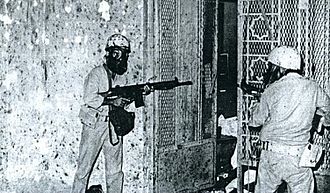
Eventually, Saudi Arabia started to fall into the old pitfall of Arab rulers. The people got more radical than the rulers. This became abundantly clear in 1979, when hundreds of armed Saudi civilians took over Mecca itself and managed to hold it for two weeks against a military onslaught from Saudi forces and allied advisors.[60] Hundreds died on both sides, and the bloody spectacle shocked the entire world. The militants had been motivated by their fury that the House of Saud had grown corrupt and apparently become too liberal.
In the wake of the attack, Saudi King Khalid caved on many of the militants' demands and imposed harsher totalitarian lifestyle restrictions on the Saudi people in accordance with the strictest interpretations of Islamic religious law.[61] The mosque attack had given influence to the most fringe Islamic theorists in Saudi Arabia, who believed that the violence was God's punishment for allowing things like women's photographs in the media and not giving enough money to religious police.[62] The king apparently came to agree and cracked down harder than ever on the Saudi people, putting more effort into their indoctrination.
In 1987 more than four hundred persons, mostly Iranian Shiite pilgrims and about 85 Saudis and security personnel, were killed during a demonstration against the "Enemies of Islam" (basically, the United States and Israel) in front of the Grand Mosque.[63] Iranian hajj pilgrims traditionally make up the largest single contingent from any single country.[64] Details about the incident and causes remain murky, with the official Saudi version contradicted by Iran's own investigation. Ayatollah Khomeini condemned the "vile and ungodly Wahhabis" as "lackeys of the United States” and called for the overthrow of the House of Saud.[65]
Gulf War and American ties[edit]
Despite all of this, Saudi Arabia remained on cordial terms with the United States. When, in 1990, Saddam Hussein kicked off the Gulf War by invading and annexing Kuwait, the Saudis asked the US to protect them out of fear that Hussein might target them next. They invited tens of thousands of US soldiers onto Saudi soil, an act which was an affront to the hardline Wahhabis. The House of Saud was acknowledged as the custodian of the Islamic religion's holiest lands, and for them to allow infidel soldiers into that land was a catastrophic breach of religious law.[66] Saudi Arabia abruptly lost the support of many of its old terrorist allies, many of whom it had helped create.
Among the most angry Saudi citizens was a certain Osama bin Laden, who was the heir of a wealthy Saudi family. Bin Laden openly denounced the Saudi relationship with the United States, and he was exiled to Sudan in 1992.[67] He eventually moved to Afghanistan and declared war upon the United States, eventually orchestrating the 9/11 attacks alongside his Al Qaeda organization and many fellow Saudi citizens.
Post 9/11[edit]
Saudi Arabia saw an immediate backlash from the West after 9/11, as it was pretty damn obvious that Saudi Arabia had created the people who were responsible. Many people in the West learned about Wahhabism for the first time as a "doctrine of terrorism and hate".[68] The kingdom still remained a US ally, though. Instead, the main threat came from inside. The Saudis experienced a huge uptick in terrorist activities as whackos were emboldened by bin Laden's attacks and wanted to strike at the House of Saud and their American allies too. In response, the Saudis blamed the Muslim Brotherhood and said that it was all their fault.[69] Nice one.
The kingdom today[edit]

Saudi Arabia's troubles with Islamic extremism seem to have motivated a new policy of showy reformism. Mohammad bin Salman (also called "MBS") is the son of the current King Salman and is the Crown Prince, making him first in line to take the throne if his father kicks it. MBS likes to ostentatiously talk about how he hopes to return Saudi Arabia to moderate Islam in order to attract investors, although it's unclear if he's talking out of his ass.[70] He then tried to substantiate his comments by enforcing some headline-grabbing reforms like allowing women to drive and allowing movie theatres and concert halls to open. However, the flashy nature of these reforms seems intentionally calculated to distract from the fact that MBS has overseen a significant crackdown against political opposition from both moderates and hardliners.[71]
Saudi journalist Jamal Kashoggi noted this in several news columns, so the Saudi state had him lured into their Istanbul consulate and brutally murdered.[72] After two weeks of denial, the Saudi government finally admitted that Khashoggi was killed during a struggle inside the consulate, apparently after a meeting with 15 men, one of whom was armed with a bone saw.[73] Intelligence analysts have argued that the killing was ordered by Saudi Arabian crown prince Mohammed bin Salman, as part of his ongoing purges.[74] In spite of the evidence, US President Donald Trump placed the blame for the murder of Khashoggi, a legal US resident, on rogue killers, and accepted a $100 million payment by the Saudi government for Syrian stabilization purposes.[75] Bizarrely enough, some conservatives attempted to justify Khashoggi's killing by arguing that he is a supporter of the Muslim Brotherhood and Osama bin Laden, even though Khashoggi has left the Brotherhood during the 90s, and only interacted with Osama as part of his duties as a journalist.[76]
Only recently have a few, very few, U.S. consultants and decision makers dare to utter the unthinkable, "What if the Saudi regime doesn't survive?" A February 2016 commentary in Atlantic Media's influential Defense One noted, "Saudi Arabia is no state at all. There are two ways to describe it: as a political enterprise with a clever but ultimately unsustainable business model, or so corrupt as to resemble in its functioning a vertically and horizontally integrated criminal organization."[77] An issue with MBS's "progressive" policies is that they isolate the Wahhabi clerics which are part of the country's extremely delicate power structure.[78]
Most horrifically, in what can only be described as a state killing spree, on the 23rd of April 2019, Saudi Arabia violently and secretly executed 37 individuals en masse, at least six of whom were minors: Mohammad Saeed Al-Skafi, Salman Amin Al-Koraysh, Mojtaba Al-Sowaiket, Abdullah Salman Al-Soraih, Abdulaziz Hassan Al-Sahwi and Abdulkarim Al-Hawaj.[79] Western nations mildly condemned this brazen violation but continued to do business with the House of Saud like absolutely nothing had happened.
Government and politics[edit]
Role of the king[edit]
Saudi Arabia is an absolute monarchy, a monarchy so absolute that they attached their last name to the country itself. In spite of occasional promises, Saudi Arabia's monarchs are not bound by any constitution. The closest thing they've got is the "Basic Law", enacted by royal decree in 1992, which basically states that the king has absolute power and is only bound by his obligation to rule in accordance with Islamic religious law.[80]
Political parties, opposition, and national elections are banned.[81] Even municipal elections are relatively rare.
All legislation is enacted by royal decree of the king or by ministerial decree (ministers are appointed by the king).[82] The king also has a bunch of different titles all designed to give him absolute control over the government. He is the prime minister, which allows him to appoint all senior government officials as well as regional governors.[82] He is also commander in chief of the Saudi armed forces, which allows him to unilaterally make foreign policy decisions and declare war and peace based on his personal whims.[82]
In practice, the king's power is limited by a number of factors. His decrees may be caught up in government inefficiency, or internal squabbles inside the royal dynasty, or even inter-tribal rivalries.[83] Such is life in a state that uses such an outdated form of governance.
Role of the Crown Prince[edit]
The Crown Prince, designated by the king, is the second most powerful person in Saudi Arabia. The post basically exists as a means by which the king may designate his successor, but the Crown Prince in practice also has broad authority to decide royal policy.[84] The current Crown Prince, Mohammad bin Salman, will likely be remembered as the defining holder of the office, as he has successfully leveraged it into becoming a serious political powerhouse answerable only to the king.[85]
'Lil Muhammad is much younger than the typical Crown Prince, as he politically outmaneuvered and purged his rivals within the royal family to claim the post.[86] So far, he's considered the architect of such brutal acts as the murder of Jamal Khashoggi, the horrifying Yemeni Civil War, and an ongoing state crackdown against dissent.[87]
The House of Saud[edit]
The current royal dynasty, the House of Saud is absolutely massive. Including is subject branches, the royal family numbers about 20,000 individuals.[88] Goddamn. To simplify things a bit, though, royal decree states that only direct patrilineal descendants of state founder Abd al Aziz may be considered amir royalty and be considered in line to take the throne. The Sudairi Seven is the name given to the current faction of the family that leads the family and country, referring to the seven sons of Ibn Saud's favorite wife. Three kings, including King Salman, come from this alliance.
With so many claimants to royal titles, and even within the Seven, infighting is inevitable. This is partially due to the fact that succession does not pass between fathers and sons, but has historically passed between brothers, so when one octogenarian king dies, his other octogenarian brothers scramble to replace him. The most severe bit of royal backstabbing came in 2017 when Crown Prince Mohammad bin Salman sliced his way through his older rivals to claim the power behind the throne, and he's since then used his powers to have other members of his family arrested, including Prince Ahmed, the youngest of the Sudairi Seven.[89] And you thought your family was dysfunctional.
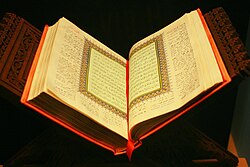
Most political power in Saudi Arabia is held by the royal family. Most senior government posts are reserved the roughly 7,000 or so amirs, as are the provincial governorships.[90] Saudi royals also benefit from an extensive royal welfare program, as the Saudi king plunders the country's wealth and hands it out to his family.[91] The House of Saud drew criticism in 2016 for implementing economic austerity and hardship upon their subjects yet still spending lavishly on their personal lifestyles.[92] The family is disgustingly wealthy, with a combined net worth estimated to be around $1.4 trillion.[9]
Religious legal system[edit]
Saudi Arabia's legal system is based upon the kingdom's interpretation of Islamic sharia law.[93] Of the countries which use a religious legal system, Saudi Arabia is both one of the loosest and one of the strictest. This is because their interpretation of sharia isn't actually codified anywhere, which means that Saudi judges tend to use their own personal views to make rulings.[94] This practice has turned the judiciary into an absolute clusterfuck, since judges can't help but make contradictory rulings and disregard judicial precedence.[95]
The disjointed nature of the legal system works just fine for Saudi elites and religious scholars. It can be as harsh as they want for certain "crimes" (like "witchcraft" or apostasy) but also ridiculously lenient for other crimes (like rape or wife-beating).[96][97]
Saudi courts have broad authority to impose horrific punishments, like beheading(!), stoning (to death!), amputation(!), crucifixion(!), and lashing(!).[98] A comparison between the punishments mandated by Saudi law and punishments used by DAESH proved disturbingly similar.[99]
Religion[edit]
Discrimination[edit]
Saudi Arabia's state religion is Sunni Islam and as such, no other religion (and definitely not the lack of a religion) is tolerated. The US considers Saudi Arabia to be the worst violator of religious rights in the world, as Saudi Arabia bans the public practice of any non-Sunni religion by either citizens or foreign visitors.[100] Shia Muslims get it worst, as they are systemically and intentionally excluded from employment options, access to education, and fair treatment by the judicial system. Shia Muslims are a significant minority population in Saudi Arabia, making up about 10% to 15% of the population.[101] However, even non-tolerated practices within Sunni Islam face persecution.[102]
Christians and members of other religions are also allowed to live in Saudi Arabia as guest workers, but they face mistreatment and are forbidden to practice or speak of their religion in public.[103] Saudi Arabia is super worried about its citizens potentially converting away from Islam. This is called apostasy, and it's often punished with the death penalty.[104]
As you can guess, Saudi Arabia hates atheists too. The country's laws absurdly classify atheism as an act of terrorism.[105] That's pretty dumb since Saudi Arabia ought to know what real terrorism looks like. Atheists are often sentenced to death, not only on atheism charges but usually with added charges for blasphemy and apostasy as well.[106]
Religious police[edit]
There is a government agency charged with enforcing Sharia law - Committee for the Promotion of Virtue and the Prevention of Vice (CPVPV); in effect, the religious police. Along with their more obvious duties of removing any signs of joy amongst the populace, this agency has an "anti-witchcraft unit" (no, seriously it does) charged with apprehending sorcerers and removing their spells.[107] So, what evidence do they use in proving someone is a witch? Well, the bar isn't high. It's because the real purpose of the witchcraft laws is to give an excuse to punish someone the government doesn't like in an absence of anything else than can call a crime.[108] Since witchcraft isn't real[citation NOT needed] it's not hard to make up an excuse to pin a charge on someone. Saudi men also like to accuse women of witchcraft in order to discredit accusations of sexual harassment.[108]
You won't be surprised to learn that the Harry Potter books are banned in the Kingdom.[109]
Alongside absurd anti-witchcraft activities, the religious police conducts far more typical acts of oppression. They have thousands of officers and many, many more volunteers who patrol the streets making sure that citizens attend their prayers, women keep their heads covered, and the sexes stay segregated.[110] Amid fears of moral anarchy, Saudi Arabia recently curbed the powers of the religious police.[111] Moral anarchy never set in (duh), but the traditional activities of the religious police have simply been passed on to other departments.
"Custodianship of the Two Holy Mosques"[edit]
“”Saudi Arabia has been clearing away its own history for almost a century, going into overdrive in the past 20 years. Wahhabi integralism has led to the elimination of every trace of Islam considered "heretical" across the country, but especially in the holy cities. In this vision art, archaeology and culture become empty words. Not even the memory of the first followers and descendants of Muhammad is respected.
|
| —Edek Osser, The Art Newspaper.[112] |
Saudi Arabia wields significant religious influence due to its control of the two holy cities of Mecca and Medina. Much of the Saudi royalty's legitimacy and prestige comes from the fact that they control the cities. Since 1986, the kings of Saudi Arabia have unilaterally adopted the title “Custodian of the Two Holy Mosques,” a title that was also used by Ottoman caliphs.[113] However, more and more people are starting to notice that the Saudis are misusing this responsibility.
Firstly, they've turned Mecca into a gaudy tourist trap which prioritizes revenue over safety for pilgrims.[114] Even though human stampedes are common and bloody, Saudi Arabia has done little to prevent further loss of life. They've also gone so far as to demolish priceless historical sites in order to make way for glitzy hotels for the rich to stay in for exorbitant prices.[115] Revenues from those hotels mainly got to funding the Saudi family's fine living.[116]
The two cities are also a political football between Saudi Arabia and its rival Iran. Iran repeatedly criticizes Saudi Arabia's mistreatment of the holy sites,[117] Iranians are also occasionally banned from making the hajj by both governments.
Religion in society[edit]
Saudi Arabia's state religion is Sunni Islam, and its citizens are effectively required to be Muslims. The Saudi royal family follows an extremely strict interpretation of Sunni Islam called Wahhabism, which shapes their internal and foreign policies.
Even without the religious police, daily life in Saudi Arabia is dominated by religious practice. Businesses close regularly throughout the day for daily prayers, and every citizen and even foreign residents are expected to attend.[118]
Television in Saudi Arabia is dominated by religious programming, and these programs are often so hateful as to incite violence against religious minorities.[119] The market is dominated by just four networks, and Saudis tend to spend significantly more time watching television than their American or European counterparts.[120] The Saudi publishing industry is similarly geared towards exclusively religious material.
Education in Saudi Arabia is available for all citizens at no immediate cost. However, Saudi schools put great effort into drilling their students into conforming with a proper Islamic lifestyle and instilling nationalism and religious pride.[121]
Saudi Arabia also encourages a uniformity of dress that is unheard of in any other Middle Eastern country.[122] Dress expectations seem to be based on Wahhabi religious teachings and the cultural traditions of Najd, the historical homeland of the Saud dynasty.
Foreign relations[edit]
OPEC[edit]
Saudi Arabia is probably the most influential member of the Organization of the Petroleum Exporting Countries, mostly due to its truly massive oil deposits. Its interests also closely align with the United States, and the two countries work together to make sure the United States can have access to Saudi oil at not-outrageous prices.[123]
Other OPEC countries, especially Russia, get antsy when Saudi Arabia tries to push them around on production issues. This has escalated rapidly into an outright price war between Saudi Arabia and Russia in 2020. Saudi Arabia ordered Russia to cut production to stabilize oil prices during the COVID crisis, and Russia's refusal prompted a competition between the two countries to bomb prices even lower to hurt each other's bottom line.[124] To shore up their other OPEC "friend", Saudi Energy Minister Abdulaziz bin Saud threatened Nigeria, Angola, and Iraq with their own oil price war if they didn’t get in line with the production cuts.[125]
United States[edit]
Despite mutual dislike, Saudi Arabia and the United States are staunch strategic allies and continually claim to be on friendly terms. The US is keen to keep Saudi Arabia on good terms, not least in order to keep that oil flowing in. Unfortunately, that has led the United States and other Western democracies into becoming complicit with Saudi misdeeds. Saudi Arabia is currently bombing civilians across Yemen and causing horrific human carnage, but the United States and United Kingdom persist in selling billions of dollars in arms.[126] The US did this both under the Barack Obama administration and the Donald Trump administration.
In return, Saudi Arabia cooperates with the United States to keep oil prices at a level that both sides consider reasonable. Most recently, Saudi Arabia arm-twisted OPEC into boosting production in 2018 after US president Donald Trump requested them to help push prices back down below $80 per barrel.[127]
The Saudi-US relationship goes back a long way, with US firms helping Saudi Arabia discover oil in the first place. Since then, the US has sought to use Saudi Arabia as a pillar to ensure security of oil traffic through the Persian Gulf and also worked closely with Saudi Arabia in the later decades of the Cold War.[128] Today, the bilateral relationship is also aimed at fucking over Iran, which Saudi Arabia hates for religious reasons.
The biggest challenge to the relationship was undoubtedly 9/11, when it was found that the vast majority of the hijackers were from Saudi Arabia. However, the alliance was just too important to drop over a small matter like the world's worst terrorist attack. In 2002, the George W. Bush administration infamously suppressed 28 pages from the House Intelligence Committee report on the attacks, fueling speculation that Bush was covering up Saudi involvement.[129] In 2016, the US Congress passed a bill that would allow 9/11 victims to sue the kingdom, despite furious Saudi threats of economic reprisals and Barack Obama's opposition.[130] Sadly, the bill's passage probably means little since Saudi Arabia is a sovereign nation, and plaintiffs will likely never be able to collect on a judgment in their favor.[131]
China[edit]
Saudi Arabia also has a close relationship with China for similar reasons as those stated above for the Americans. Saudi Arabia is a major beneficiary of China's Belt and Road Initiative, which sees China throw around investment money to boost other countries' infrastructure.[132] China's president Xi Jinping has stated that Chinese investment and friendship with Saudi Arabia would continue regardless of future political developments.[133]
In return, Saudi Arabia has covered for one of China's worst recent human rights atrocities: their use of internment and re-education camps for Uyghur Muslims. Despite the oppression being aimed at fellow Muslims by a state promoting atheism, Saudi Arabia has taken every opportunity to defend China's actions as being motivated by simple counter-terrorism.[134] Saudi Arabia also joined a group of United Nations members in signing an open letter opposing any action against China.[135] Authoritarians gotta stick together.
War in Yemen[edit]
In response to a coup by Shiite Muslims (called Houthis) in Yemen, Saudi Arabia began a violent military intervention targeted at its southern neighbor. The Saudis justified themselves by claiming that the Houthis were proxies of Iran, a claim which was then untrue but eventually became reality.[136] The Saudi-led coalition has received both direct and indirect support from the United States and the UK.[137]
This is unfortunate because the Saudi campaign in Yemen is one of extreme brutality and disregard for life. Saudi Arabia infamously used a US-built weapon to bomb a school bus in 2018, killing 40 children and 11 adults.[138] Fuck. Saudi coalition airstrikes are directed not only at military targets but at funerals, schools, markets, residential areas, and civilian watercraft.[139] The Saudis also have Yemen under a blockade that has stopped shipments of medicine, food, and water, imperiling Yemeni civilians.[140] The resulting famine has killed more than 85,000 Yemeni children.[141]
Cold war with Iran[edit]
The aforementioned war in Yemen can be best understood as an extension of the ongoing proxy war between Saudi Arabia and Iran. Saudi Arabia has been a furious enemy of Iran ever since the 1979 revolution there; after all, a Shia theocracy and a Sunni theocracy were never destined to get along too well.[142] Since then, their attempts to undermine each other and fight over influence in the Middle East have left the region in ruins.
Through their efforts, both powers have encouraged a deadly increase in Sunni-Shia sectarianism in places like Iraq and Syria, contributing to religious extremism and civil war.[143] Countries fucked over by the regional dick-swinging include Lebanon, where Iranian proxy Hezbollah seeks to muscle out Saudi-backed Sunnis.[144] Also involved is Syria, where Saudi and Iranian-backed militias turned the country into a ruined war zone.[144] A similar story is playing out in Iraq. And, of course, there's the Yemen conflict, where Saudi Arabia is bombing the shit out of civilians on the belief that the Houthi rebels are taking money from Iran.
The Muslim cold war has also created some interesting bedfellows, as Saudi Arabia has drawn closer to Israel in order to jointly oppose Iran.[145] What's that saying about enemies of enemies? In 2023, however, China hosted very successful talks to re-establish ties between Iran and Saudi Arabia.[146] Perhaps the two can get along after all.
Spreading Wahhabism[edit]
Saudi Arabia has also put much effort into spreading the extremist ideology of Wahhabism, which has been the ideological undercurrent of terrorist groups across the world. This has been going on for decades, as Saudi Arabia has used its oil money to fund religious schools and indoctrinate vulnerable youths into hating other Muslims and non-Muslims.[147] The total amount of money they've spent doing this is estimated to be somewhere in the $100 billion range.[148]
While Saudi Arabia publicly decries terrorism, it still continues to support Wahhabi indoctrination abroad, and its royal family still practices and enforces a genuinely hateful version of Islamic thought.[149]
Due to Saudi efforts, Islamic radicalism is slowly gaining a great following across Southeast Asia, Africa, and even among disaffected Muslims living in Europe.[150] In all instances, Saudi-funded religious institutions are found to be responsible for indoctrinating Muslims in the ways of hate.
Human rights[edit]
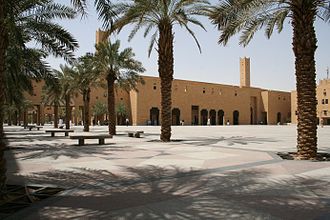
Executions and cruel punishments[edit]
Saudi Arabia is generally ranked, alongside North Korea, as one of the most repressive nations on Earth. As shown in above sections, a huge number of crimes come with mandatory death penalties, and methods of execution are often traumatic and horrific. Execution is usually carried out by beheading, but crucifixion may be performed for more serious crimes.[152] Even while the rest of the world sees declining rates of executions, Saudi Arabia continually steps up their application of the ultimate punishment. In 2019, Saudi Arabia topped its own record by executing 184 people in one year.[153]
Non-lethal punishments can also be horrifying. For instance, many theft-related crimes can be punished by forced amputation of the hands and/or feet.[154] Other criminals may be sentenced to torture, methods of which can include beating for hours or electrocution.[154]
Amid increasingly negative international attention, Saudi Arabia has turned its modernizing efforts to making the criminal justice system a bit less Medieval. Saudi Arabia's king has recently stated that the kingdom would end the use of flogging as a punishment and also halt the use of capital punishment against minors.[155] However, there's not been word about when that decision will be implemented.
Women's rights[edit]
In Saudi Arabia, women are regarded as second-class citizens. Women are thought to be the property of their husbands, and until the 24th of June, 2018, so much as driving a car could earn a woman ten lashes of a whip.[156] Since 2011, the country has begun to enter the 21st 19th Century by slowly allowing women to work in retail. This has been followed by an organized campaign by Abdullah Muhammad al-Dawood of sexual harassment of women retail workers.[157]
Despite the recent allowance for women to drive cars, they still face other harsh restrictions. Saudi women still must obtain a male guardian’s approval to get married, leave prison, or obtain certain healthcare.[158] Women also continue to face discrimination in relation to marriage, family, divorce, and decisions relating to children (e.g. child custody).[158] Leaving abusive situations is also impossible, as women may be sued by their male relatives or spouses for "disobedience" and forcibly returned to their custody.[158]
Policies against women in Saudi Arabia has been described as a situation known as gender apartheid.[159]
Freedom of speech and assembly[edit]
Despite reforms elsewhere, Saudi Arabia has stepped up its repression of its citizens' political rights. Activists, particularly for women's rights, are arbitrarily arrested and detained for weeks without charge in harsh conditions.[160] Saudi Arabia also has a Specialized Criminal Court (SCC) which it uses both as a counter-terror court and as a means to inflict heavy charges on people who peacefully oppose the regime. Saudi authorities do not permit the formation of political parties, trade unions or independent human rights groups, and continue to prosecute and imprison those who set up or participated in unlicensed human rights organizations.[160] Public political gatherings have been banned by ministerial decree since 2011. Worst of all, Saudi Arabia infamously assassinated Jamal Khashoggi abroad for criticizing the regime's human rights record. It has since been uncooperative in investigations.
LGBT rights[edit]
There are none! The Saudi judicial system blames social media for causing an increase in 'deliberate' acts of homosexuality. Homosexuality is punishable by death. As of the first half of 2016, there were 35 people on death row in Saudi Arabia for sodomy.[161]
Saudi Arabia is also murderously hostile to transgender people, as they demonstrated in 2017 when Saudi police tortured two transgender Pakistanis to death by binding them in sacks and beating them with sticks.[162]
Human trafficking[edit]
“”Get over it. Get over it! So what? So what they have enslaved people. So what? It’s not my problem. They’re paying me to keep my mouth shut.
|
| —comedian Tim Dillon, 3 weeks before he was disinvited to Saudi Arabia's first 'comedy' festival[163] |
While slavery supposedly was abolished in 1962, human trafficking remains a big problem in Saudi Arabia, where thousands of children, men and women live as slaves. Foreign workers, especially women, are often subjected to sexual abuse and rape. This is exacerbated by the widespread — but erroneous — belief that Saudi employers are entitled to confiscate employees' passports upon entry to the country.[164] Thousands of immigrants have fled their employers claiming to have been enslaved and abused.[165]
Economy[edit]
Overview[edit]
Saudi Arabia is currently the largest economy in the Middle East and is currently ranked 18th in the world's largest economies. Most of that wealth comes from the oil, as Saudi Arabia has the world's second-largest proven oil reserves.[166] About 65% of the kingdom's revenues come from the sale of oil.[167] Due to this hefty economic weight, Saudi Arabia is considered to be the most influential member of OPEC and often bullies the fellow cartel members into obeying the kingdom's wishes.
Saudi Aramco[edit]
Ever since the joint American company was bought out by the Saudi state in 1976, Saudi Aramco has functioned as Saudi Arabia's state-run oil corporation through which it manages most of its petroleum economy.[168] It is by far the world's most profitable corporation, easily surpassing small fry like Google or Apple, and its estimated value is $2 trillion.[169]
As the engine of the Saudi oil industry, Aramco is occasionally targeted by cyberattacks and terrorist strikes.[170]
Foreign workers[edit]
Saudi Arabia has extremely low rates of unemployment and imports huge numbers of foreign workers to perform both menial and technical tasks.[171] There are millions of them, mostly Bangladeshis, Indians, Filipinos, Nepalis, Pakistanis and Yemenis, and Saudi xenophobia results in their mistreatment.[172] Foreign workers are bound by the abusive kafala system that puts them under total authority of their employers and makes them vulnerable to arbitrary deportation or detention.[173]
Gallery[edit]
A pilgrim family at Mecca.
Notes[edit]
- ↑ That combination of words is a red flag for some really terrible shit. Never mix religion and state, because doing so will only ruin both (the state especially)!
- ↑ And also for wanting nothing to do with communism. The Cold War may be officially over, but it's left lasting scars.
- ↑ And as previously established, the result has been a perpetual disaster.
- ↑ Not unlike how it is today.
References[edit]
- ↑ The West Wing, "Enemies Foreign and Domestic," season 3. Sure, it's from a work of fiction, but it's still a startlingly accurate description.
- ↑ Hajj Pilgrimage Fast Facts. CNN.
- ↑ Analysis: Britain helped create Saudi Arabia – the Establishment won’t give up their influence without a fight. Source News.
- ↑ How Britain Carved Up the Middle East and Helped Create Saudi Arabia. Mark Curtis: British foreign policy declassified.
- ↑ How Saudi Wahhabism Is the Fountainhead of Islamist Terrorism. Huffington Post.
- ↑ See the Wikipedia article on Hijackers in the September 11 attacks.
- ↑ Trump's Evolving Relationship With Saudi Arabia. NPR.
- ↑ Trump's deference to Saudi Arabia infuriates much of D.C. Politico.
- ↑ 9.0 9.1 Saudi royal family's $1.4 trillion wealth and lavish spending. TRT World.
- ↑ Holes, Clive (2001). Dialect, Culture, and Society in Eastern Arabia: Glossary. Clive Holes. pp. XXIV–XXVI. ISBN 978-9004107632.
- ↑ Saudi Arabia: Pre-Islamic Period. Country Studies. - "The material conditions under which the Arabs lived began to improve around 1000 B.C. A method for saddling camels had been developed to transport large loads. The camel was the only animal that could cross large tracts of barren land with any reliability. The Arabs could now benefit from some of the trade that had previously circumvented Arabia."
- ↑ Watt, W. Montgomery (1953). Muhammad at Mecca. Oxford University Press. ISBN 978-0-19-577277-7. ASIN: B000IUA52A. p. 1-2.
- ↑ Buhl, F.; Welch, A.T. (1993). "Muḥammad". Encyclopaedia of Islam. 7 (2nd ed.). Brill. pp. 360–376. ISBN 978-90-04-09419-2.
- ↑ Watt, W. Montgomery (1953). Muhammad at Mecca. Oxford University Press. ISBN 978-0-19-577277-7. ASIN: B000IUA52A. p. 8
- ↑ Khan, Majid Ali (1998). Muhammad the final messenger (1998 ed.). India: Islamic Book Service. p. 332. ISBN 978-81-85738-25-3.
- ↑ Muhammad Biography. Biography.com
- ↑ 17.0 17.1 17.2 Saudi Arabia: Early Islam. Country Studies.
- ↑ See the Wikipedia article on Sumayyah bint Khabbat.
- ↑ See the Wikipedia article on Bilal ibn Rabah.
- ↑ See the Wikipedia article on Year of Sorrow.
- ↑ See the Wikipedia article on Abū Lahab.
- ↑ Constitution of Medina. Brown University.
- ↑ The “Constitution of Medina” and Muhammad. Understanding Islam.
- ↑ Islam Ascendant. Lumen Learning.
- ↑ See the Wikipedia article on Rashidun Caliphate.
- ↑ George Saliba (1994), A History of Arabic Astronomy: Planetary Theories During the Golden Age of Islam, pp. 245, 250, 256–57. New York University Press, ISBN 0-8147-8023-7.
- ↑ 27.0 27.1 27.2 27.3 Saudi Arabia: The Middle Ages. Country Studies.
- ↑ 28.0 28.1 The Qarmatians: The world's first enduring communistic society. World Bulletin.
- ↑ Qarmatiyyah. Archived.
- ↑ See the Wikipedia article on Sharif of Mecca.
- ↑ Bowen, Wayne H. (2007). The History of Saudi Arabia. ISBN 978-0-313-34012-3. p. 68
- ↑ Ibn Abd al-Wahhab, Muhammad. Oxford Islamic Studies.
- ↑ DeLong-Bas, Natana J. (2004). Wahhabi Islam: From Revival and Reform to Global Jihad (First ed.). New York: Oxford University Press. p. 245. ISBN 0-19-516991-3.
- ↑ See the Wikipedia article on Emirate of Diriyah.
- ↑ See the Wikipedia article on Emirate of Nejd.
- ↑ Zeine N. Zeine (1973) The Emergence of Arab Nationalism (3rd ed.). Delmar, New York: Caravan Books Inc. ISBN 0882060007. pp. 60-61, 83-92.
- ↑ 37.0 37.1 The Rise of Abd Al Aziz. Country Studies.
- ↑ Tucker, Spencer; Priscilla Mary Roberts (205). The Encyclopedia of World War I. p. 565. ISBN 978-1-85109-420-2.
- ↑ The Arab Revolt: A war of unintended consequences. Al Jazeera.
- ↑ See the Wikipedia article on Sykes–Picot Agreement.
- ↑ Husayn ibn Ali, King of Hejaz. Encyclopedia of the First World War.
- ↑ A History of Saudi Arabia. Middle East Policy Council.
- ↑ Rule of Abd Al Aziz. Country Studies.
- ↑ Lacey, Robert (2009). Inside the Kingdom. pp. 15–16. ISBN 978-0-09-953905-6.
- ↑ Mark Weston (2008). Prophets and princes: Saudi Arabia from Muhammad to the present. John Wiley and Sons. pp. 102–103. ISBN 978-0-470-18257-4.
- ↑ See the Wikipedia article on History of the oil industry in Saudi Arabia.
- ↑ 47.0 47.1 47.2 47.3 The Reigns of Saud and Faisal. Country Studies.
- ↑ ARAMCO CONFIRMS OIL LABOR STRIFE; 13,000 Saudi Arabians Strike After Union Organizers Are Arrested by Regime. New York Times.
- ↑ Organization of the Petroleum Exporting Countries (OPEC). Investopedia.
- ↑ A biography of King Faisal: Unexpectedly Modern. The Economist.
- ↑ David Commins (2006). The Wahhabi Mission and Saudi Arabia. p. 110. ISBN 1-84511-080-3.
- ↑ See the Wikipedia article on Faisal bin Musaid.
- ↑ See the Wikipedia article on Faisal bin Musaid Al Saud § Assassination and trial.
- ↑ Joy Winkie Viola (1986). Human Resources Development in Saudi Arabia: Multinationals and Saudization. p. 37. ISBN 978-0-88746-070-8.
- ↑ Oil Embargo, 1973–1974. US State Department.
- ↑ Ahrari, Mohammed E. (January 13, 2015). "5. The Oil Embargo". OPEC: The Failing Giant. University Press of Kentucky. ISBN 978-0-8131-5665-1.
- ↑ Analysis: Wahhabism. PBS Frontline.
- ↑ 58.0 58.1 Analysis: Madrassas. PBS Frontline.
- ↑ History of the Taliban. ThoughtCo.
- ↑ See the Wikipedia article on Grand Mosque seizure.
- ↑ Wright, Robin (2001). Sacred Rage: The Wrath of Militant Islam. Simon and Schuster. p. 155. ISBN 978-0-7432-3342-2.
- ↑ Lacey, Robert (2009). Inside the Kingdom : Kings, Clerics, Modernists, Terrorists, and the Struggle for Saudi Arabia. Viking. p. 48.
- ↑ Mecca massacre
- ↑ US Saudi Arabia Diplomatic and Political Cooperation Handbook, USA International Business Publications, 2007, p. 178.
- ↑ "Iran convened an “International Congress on Safeguarding the Sanctity and Security of the Great Mosque,” under the auspices of the ministry of Islamic guidance and the foreign ministry. Rafsanjani, in addressing the three hundred participants from 36 countries, called for the “liberation” of Mecca and the establishment of an “Islamic International” which would govern Mecca as a free city." Kramer, Khomeini’s Messengers.
- ↑ DeLong-Bas, Natana J. (2004). Wahhabi Islam: From Revival and Reform to Global Jihad (First ed.). USA: Oxford University Press. p. 269. ISBN 0-19-516991-3.
- ↑ Osama Bin Laden. PBS Frontline.
- ↑ Long, David E (2005). "Saudi Arabia [review of Wahhabi Islam by Natana DeLong-Bas]". Middle East Journal. 59 (2): 316–19. JSTOR 4330135.
- ↑ Saudi Arabia’s Muslim Brotherhood predicament. Washington Post.
- ↑ I will return Saudi Arabia to moderate Islam, says crown prince. The Guardian.
- ↑ The Paradox of Saudi Arabia’s Social Reforms. PBS.
- ↑ The High Cost of Change. Human Rights Watch.
- ↑ Hubbard, Ben. "Jamal Khashoggi Is Dead, Saudi Arabia Says". New York Times. Retrieved 19 October 2018.
- ↑ Wintour, Patrick (19 October 2018). "Evidence suggests crown prince ordered Khashoggi killing, says ex-MI6 chief". the Guardian. Retrieved 19 October 2018.
- ↑ Wintour, Patrick; Chulov, Martin (15 October 2018). "Donald Trump says 'rogue killers' may have murdered Khashoggi". The Guardian. Retrieved 15 October 2018.
- ↑ Costa, Robert (19 October 2018). "Conservatives mount a whisper campaign smearing Khashoggi in defense of Trump". Washington Post. Retrieved 19 October 2018.
- ↑ Start Preparing for the Collapse of the Saudi Kingdom, February 16, 2016, By Sarah Chayes & Alex de Waal, De3fense One.
- ↑ The 32-year-old prince who’s shaking up Saudi Arabia, Vox
- ↑ Ruairi Wood: The families of six executed Saudi minors only heard the news through state media., Amity Underground
- ↑ See the Wikipedia article on Basic Law of Saudi Arabia.
- ↑ World and Its Peoples: the Arabian Peninsula. Marshall Cavendish. 2007. p. 78. ISBN 978-0-7614-7571-2.
- ↑ 82.0 82.1 82.2 Saudi Arabia: The King. Country Studies.
- ↑ Saudi Arabia: Government and Society. Britannica.
- ↑ See the Wikipedia article on Crown Prince of Saudi Arabia.
- ↑ Saudi Arabia’s crown prince, backed by the king, moves for absolute power. The Conversation.
- ↑ Mohammed bin Salman: The dark side of Saudi Arabia's crown prince. Al Jazeera.
- ↑ MBS must shelve his vicious war in Yemen. Asia Times.
- ↑ Saudi Arabia: The Royal Family. Country Studies.
- ↑ Saudi royal arrests: Why top princes have been silenced. BBC News.
- ↑ The Monarchies of the Middle East: Saudi Arabia. Lumen Learning.
- ↑ WikiLeaks: Saudi Royal Welfare Program Revealed. Huffington Post.
- ↑ Saudi Royal Family Is Still Spending in an Age of Austerity. New York Times.
- ↑ Campbell, Christian (2007). Legal Aspects of Doing Business in the Middle East. p. 265. ISBN 978-1-4303-1914-6.
- ↑ Hefner, Robert W. (2011). Shari'a Politics: Islamic Law and Society in the Modern World. p. 58. ISBN 978-0-253-22310-4.
- ↑ Otto, Jan Michiel (2010). Sharia Incorporated: A Comparative Overview of the Legal Systems of Twelve Muslim Countries in Past and Present. ISBN 978-90-8728-057-4. p. 161–162
- ↑ Law of God versus law of man. The Economist.
- ↑ Cruel, or just unusual?: A look at Saudi Arabia’s Islamic laws and the judges who apply those laws. The Economist.
- ↑ 15 outrageous facts about Saudi Arabia. CBS News.
- ↑ Crime and punishment: Islamic State vs Saudi Arabia. Middle East Eye.
- ↑ US commission: Saudi Arabia is top violator of religious freedom. Middle East Eye.
- ↑ See the Wikipedia article on Religion in Saudi Arabia.
- ↑ Robert Murray Thomas. Religion in Schools: Controversies Around the World. Greenwood Publishing Group, 2006. ISBN 978-0-275-99061-9 page 180
- ↑ Cookson, Catharine (2003). Encyclopedia of religious freedom. Taylor & Francis. p. 207. ISBN 978-0-415-94181-5.
- ↑ The lonely atheist: why renouncing your religion in Saudi Arabia can be deadly. The New Statesman.
- ↑ Saudi Arabia declares all atheists are terrorists in new law to crack down on political dissidents. The Independent.
- ↑ Man ‘sentenced to death for atheism’ in Saudi Arabia. The Independent.
- ↑ Saudi Arabia's War on Witchcraft. The Atlantic.
- ↑ 108.0 108.1 How Do You Prove Someone’s a Witch in Saudi Arabia? Foreign Policy.
- ↑ Saudi Arabia's 'Anti-Witchcraft Unit' breaks another spell
- ↑ Antoinette Vlieger (2012). Domestic Workers in Saudi Arabia and the Emirates: A Socio-legal Study on Conflicts. Quid Pro Books. p. 45. ISBN 9781610271295.
- ↑ A year after curbing its power, the Saudi religious police is deemed redundant by many. Arab News.
- ↑ Why is Saudi Arabia destroying the cultural heritage of Mecca and Medina?. The Art Magazine.
- ↑ See the Wikipedia article on Custodian of the Two Holy Mosques.
- ↑ The Failure of the Custodian of the Holy Sanctuary. Foreign Policy.
- ↑ The destruction of Mecca. The Economist.
- ↑ King Salman: Relinquish Guardianship of Islam’s Holy Sites! Huffington Post.
- ↑ Iran Says Saudi Arabia Should Not Control Muslim Holy Sites. Newsweek.
- ↑ Tripp, Harvey; North, Peter (2009). CultureShock! A Survival Guide to Customs and Etiquette: Saudi Arabia (3rd ed.). Marshall Cavendish. p. 214
- ↑ Saudi Arabia shuts office of TV channel for fomenting sectarian tension. Reuters.
- ↑ See the Wikipedia article on Television in Saudi Arabia.
- ↑ What Type Of Education System Does Saudi Arabia Have? World Atlas.
- ↑ Long, David E. (2005). Culture and Customs of Saudi Arabia. Westport, CT: Greenwood Press. ISBN 0313320217. p.57–9
- ↑ U.S. Relations With Saudi Arabia. US State Department Archive.
- ↑ See the Wikipedia article on 2020 Russia–Saudi Arabia oil price war.
- ↑ Saudi Arabia Is Bullying OPEC Members Into Compliance. OilPrice.com
- ↑ US leads arms sales to Saudis, followed by UK, from 2014-2018. The Guardian.
- ↑ OPEC oil output boost in September limited by Iran losses: Reuters survey. Reuters.
- ↑ U.S.-Saudi Arabia Relations. Council on Foreign Relations.
- ↑ The Twenty-Eight Pages. The New Yorker.
- ↑ Saudi Arabia Warns of Economic Fallout if Congress Passes 9/11 Bill. New York Times.
- ↑ What the 9/11 Lawsuits Bill Will Do. Council on Foreign Relations.
- ↑ China to Boost Belt and Road Links with Saudi Arabia. Maritime Executive.
- ↑ China vows to boost ties with Saudi Arabia amid growing turmoil in Middle East. South China Morning Post.
- ↑ Saudi Arabia's Mohammed bin Salman Defends China's Use of Concentration Camps for Muslims During Visit to Beijing. Newsweek.
- ↑ Which Countries Are For or Against China’s Xinjiang Policies? The Diplomat.
- ↑ If Yemen's Houthis weren't Iranian proxies before, they could be soon Snyder, Stephen. Public Radio International. March 25, 2017
- ↑ British support of Saudi Arabian military should shame us all, says SNP MP Iain Smith. The Herald. 27th November 2017
- ↑ US supplied bomb that killed 40 children on Yemen school bus. The Guardian.
- ↑ YEMEN 2017/2018 Amnesty International.
- ↑ Yemen: Coalition Blockade Imperils Civilians Human Rights Watch. December 7, 2017.
- ↑ See the Wikipedia article on Famine in Yemen (2016–present).
- ↑ Why Saudi Arabia and Iran are bitter rivals. BBC News.
- ↑ How the Iranian-Saudi Proxy Struggle Tore Apart the Middle East. New York Times.
- ↑ 144.0 144.1 Saudi-Iran proxy wars: In pursuit of regional hegemony. Al Jazeera.
- ↑ Israel and Saudi Arabia: What's shaping the covert 'alliance'. BBC News.
- ↑ "Saudi Arabia and Iran Agree to Re-establish Ties in Talks Hosted by China". The New York Times.
- ↑ Friedman, Thomas L. (2 September 2015). "Our Radical Islamic BFF, Saudi Arabia". The New York Times. ISSN 0362-4331.
- ↑ Extremism Is Riyadh’s Top Export. Foreign Policy.
- ↑ Wahhabism to ISIS: how Saudi Arabia exported the main source of global terrorism. The New Statesman.
- ↑ Saudi Arabia exports extremism to many countries - including Germany, study says. Deutsche Welle.
- ↑ Saudi Justice? Leung, Rebecca. CBS 05.06.04
- ↑ Saudi prisoner 'executed and crucified'. BBC News.
- ↑ Amnesty: Saudi Arabia executed record number of people in 2019. Al Jazeera.
- ↑ 154.0 154.1 Saudi Arabia: Save Convicts from Amputation. Human Rights Watch.
- ↑ Saudi Arabia ends executions for crimes committed by minors, says commission. BBC News.
- ↑ Saudi court orders woman to be whipped for driving car AP/NBC News
- ↑ New Employment Opportunities for Saudi Women
- ↑ 158.0 158.1 158.2 World Report 2020 Saudi Arabia. Human Rights Watch.
- ↑ Manea, Elham (30 December 2013). "Women in Saudi Arabia are caught in a system of gender apartheid". dw.com. Retrieved 15 April 2022.
- ↑ 160.0 160.1 Saudi Arabia 2019. Amnesty International.
- ↑ Saudi Arabia 'pushes for homosexuals to be executed' amid fears social media is 'turning people gay', By Rhian Lubin, Mirror, 1 April 2016. www.mirror.co.uk
- ↑ Two transgender Pakistanis 'tortured to death' in Saudi Arabi. The Independent.
- ↑ Saudi comedy festival draws big names and backlash: Human rights advocates and some comics say the festival, at which Bill Burr, Louis C.K., Dave Chappelle and Kevin Hart are performing, whitewashes abuses. by Mikhail Klimentov & Ethan Beck (September 30, 2025) The Washington Post (archived from 30 Sep 2025 18:38:15 UTC).
- ↑ Holding onto Employee Passports: Unlawful
- ↑ Kalami, Mehr A. Slavery Continues: Hope of Breaking the Chains. iUniverse, 2014.
- ↑ See the Wikipedia article on List of countries by proven oil reserves.
- ↑ Saudi Arabia Sees Higher Oil Revenue as OPEC Cuts Boost Prices. Bloomberg.
- ↑ "The Report: Saudi Arabia 2009". Oxford Business Group. 2009. p. 130. ISBN 978-1-907065-08-8.
- ↑ What Is Saudi Aramco? Investopedia.
- ↑ See the Wikipedia article on Saudi Aramco.
- ↑ Saudi Arabia: Economy. Britannica.
- ↑ Saudi Arabia rounds up migrant workers as amnesty ends. BBC News.
- ↑ Saudi Arabia: Protect Migrant Workers’ Rights. Human Rights Watch.
Categories: [Middle Eastern countries] [Crimes against humanity] [Totalitarianism] [Antisemitism] [Anti-Christian bigotry] [Atheophobia] [Homophobia] [Transphobia] [Racism] [Sexism] [Islamic extremism] [Authoritarian regimes] [Islam] [Religious discrimination] [Saudi Arabia] [Islamism] [Theocracy] [Apartheid]
↧ Download as ZWI file | Last modified: 11/05/2025 07:12:31 | 110 views
☰ Source: https://rationalwiki.org/wiki/Saudi_Arabia | License: CC BY-SA 3.0
_-_SAU_-_UNOCHA.svg.png)
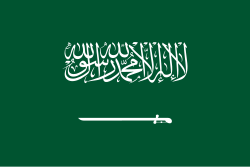
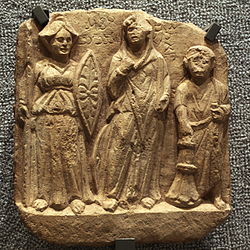
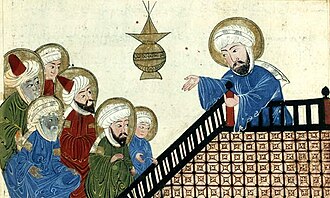
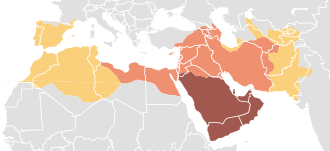
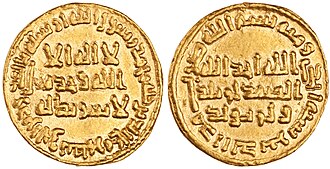
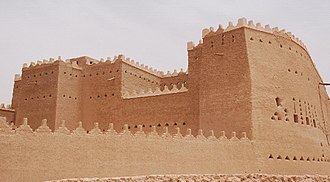
.jpg)
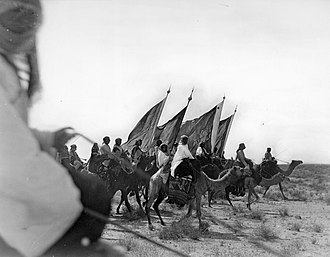




_(cropped).jpg)
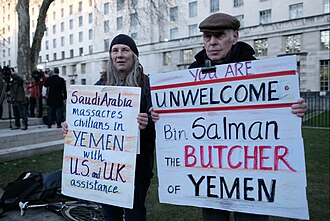
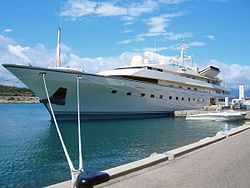
.jpg)


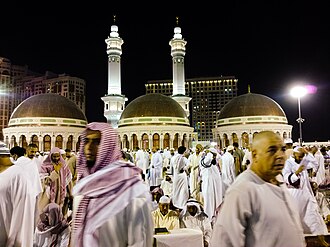
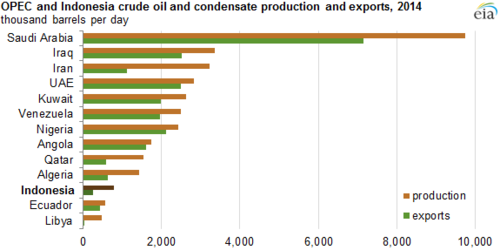
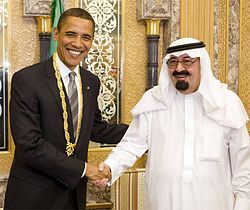


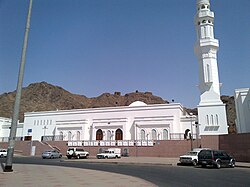
.jpg)
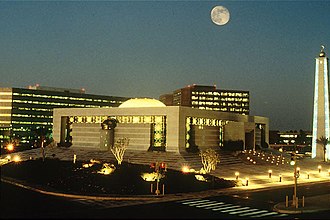
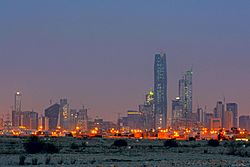
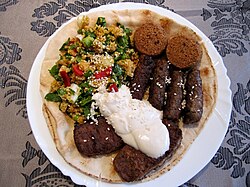


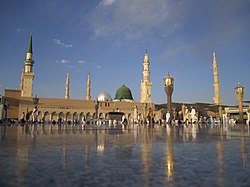
 KSF
KSF